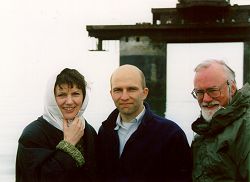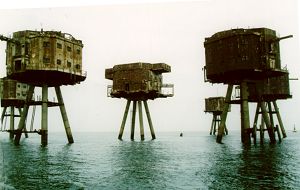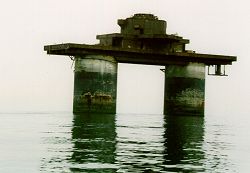New Brass Band Music Celebrates Kent Landmarks
New Brass Band Music Celebrates Kent LandmarksNew Brass Band Music Celebrates Kent Landmarks
Landmarks off the North Kent coast were celebrated by brass bands from all over Britain on September 14th 2002 in Birmingham's Symphony Hall, where the 150th Anniversary of the first-ever Open Brass Band Championships took place. The competing bands' new test piece is entitled The Maunsell Forts, and was commissioned by the BBC from John McCabe, who came to live in the Swale area of Kent two years ago.

Left to right - Monica McCabe, Gary Smith
and John McCabe at Knock John fort.
Photo © Gary Smith
'Shortly after my wife and I moved here', he explains, 'we were taken on a boat trip to see the forts, by my wife's nephew, Gary Smith, and his girl-friend Kate Roullier. I was so impressed by the forts that, when the Band Championships' organisers asked me to write a new piece of music for the contest I decided to write the work about them.'

'Shivering Sands' Fort. The stump of one of the
legs of the missing structure (knocked down by
a passing ship during fog) may be clearly seen -
as can a marker buoy. Photo © Gary Smith
The Maunsell Sea Forts are military defence structures from the Second World War, designed and built under the supervision of engineer Guy Maunsell. There are two different types: one a large single superstructure atop two huge cylindrical legs of concrete, the other resembling nothing so much as the tripods from H.G. Wells' The War of the Worlds, but in this case with four legs instead of three. The new band piece, which is dedicated to Gary and Kate, was written after a boat trip around three of them - Knock John, Shivering Sands and Red Sands - leaving from the North Kent coast, from where, on a clear day, it's possible to see them with the naked eye. 'The Maunsell Forts is subtitled Nocturne for Brass Band', explains McCabe, 'because it is framed by quiet music reflecting the atmosphere of mystery that struck me so vividly, and the fact that it would have been at night that the greatest danger came. It was, as it happens, a fine and calm day when we made our trip, but it is easy to imagine a very different situation.'

'Knock John' Fort - the other type of
Maunsell Fort. Each of the massive concrete
legs formed accommodation for the troops
manning the fort. Photo © Gary Smith
After the visit to the forts, McCabe purchased the three fine books about them, by Frank R. Turner (published by the author), which are extensively illustrated by photographs both of the time when the forts were constructed and placed in situ, and from more recent days. 'The Thames estuary forts still stand', says McCabe, 'as a memorial, as well as intriguing and remarkably affecting artefacts, an unexpected page of recent, but not yet forgotten, human history.'

'Red Sands' Fort. The line of the 'red'
sand bank on which it stands may be clearly
seen, as can the isolation of the fort's
position. Photo © Gary Smith
At Symphony Hall, Birmingham on September 14th, they and the men who built them, as well as those who manned them during the war, were celebrated in 20 performances by the top 20 Championship level Brass Bands in the United Kingdom. The championship winners were Buy As You View Corey Band, conducted Robert Childs (1st place), Fodens Band under Bramwell Tovey (2nd), Black Dyke with Nicholas Childs (3rd), Brighouse & Rastrick (4th), The Cwmaman Institute (5th) and the Williams Fairey Band (6th).


